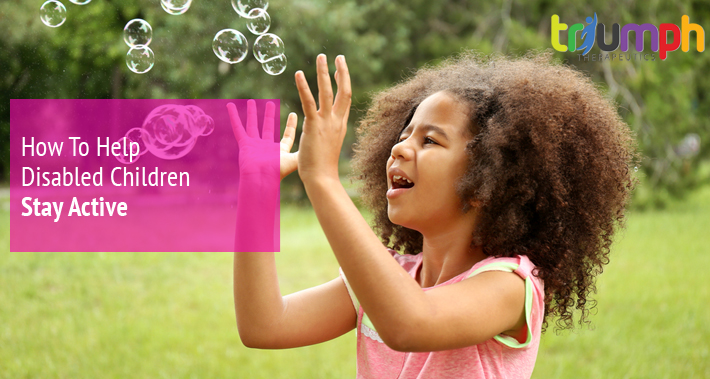How To Help Disabled Children Stay Active?
https://www.triumphtherapeutics.com/wp-content/uploads/2022/06/Triumph-Therapeutics-Speech-Therapy-OT-Physcial-Therapist-Washington-DC-Jun03-01-2022.jpg 710 379 Triumph Therapeutics Triumph Therapeutics https://www.triumphtherapeutics.com/wp-content/uploads/2022/06/Triumph-Therapeutics-Speech-Therapy-OT-Physcial-Therapist-Washington-DC-Jun03-01-2022.jpgAre you the parent of a disabled child?
Do you struggle with getting your child to stay active?
At Triumph Therapeutics, we know how difficult it can be for disabled children to get enough physical activity.
In fact, children with disabilities are often less active than their abled peers.
Fortunately, we can help.
Whether you’re looking for a Washington DC pediatric physical therapy clinic, an occupational therapy clinic near me, or just want some tips on how to keep your disabled child active, you’ve come to the right place.
Keep reading to learn more.
The Consequences Of Inactivity
Keeping active is important for your child’s health and development.
The consequences of inactivity are numerous and potentially life threatening.
For example, an inactive lifestyle can contribute to higher risks of cancer, heart disease, and strokes.
Some other consequences of inactivity include:
- Increased bone loss
- Poor blood circulation, potentially leading to blood clots
- Poor mental health, such as low self esteem and confidence
- Less independence, and relying on others for daily needs
- Less social interactions
However, a number of different health conditions can hamper your child’s ability to remain active.
These include, but are not limited to:
- Spina bifida
- Down syndrome
- Juvenile rheumatoid arthritis
- Hypotonia
- Muscular dystrophy
- Cerebral palsy
- Pediatric traumatic brain injury
- Autism spectrum disorder
- Congenital muscular torticollis
- Clubfoot
The Benefits Of Regular Activity
Fortunately, you can mitigate the risk of experiencing these consequences by participating in regular physical activity.
Therefore, it is important to teach the importance of physical activity to your children early.
Benefits of regular physical activity include:
- Stronger muscles
- Better endurance
- Better overall health
- Better mental health, self esteem, and confidence
- Better concentration
- Better balance
- Better social skills
- More independence
- Improved motor strength
- Better teamwork
- Improved cognitive health
- Reduced risk of certain diseases, such as type 2 diabetes and heart disease
It’s important to note, too, that all of the above is true whether your child is disabled or not.
How Much Activity Do Children Need?
On average, you should strive to get your child to participate in physical activity for 120 to 180 minutes every week.
This goal can be achieved in multiple different ways.
For instance, your child may participate in physical activity 20 minutes every day, or 40 minutes three times a week.
For younger children, it may be easier to break down exercise into numerous small intervals all throughout the day.
Tips For Keeping Your Disabled Child Active
Having a disability often impacts a child’s ability to participate in regular physical activity.
Therefore, we have put together a few tips for keeping your disabled child active.
1. Understand The Barriers Your Child Faces
Children with disabilities face multiple barriers in their everyday lives that can make physical activity more difficult.
It is important that you identify the specific barriers impacting your child.
For example, a child with cerebral palsy would face barriers to physical activities that require them to maintain balance.
Some other examples of barriers to physical activity you and your child may encounter include:
- Physical or mental limitations
- The cost of recreation programs
- Lack of recreation and sport facilities that support your child’s disabilities
- Lack of time
- Lack of confidence
- Lack of support from family, school, and peers
- Lack of role models who are physically active
- Fear of injury
- Lack of motivation
Once you have identified the barriers that are affecting your child’s ability to participate in regular physical activity, you can begin to look for solutions.
For example, setting short term goals or enrolling your child into a program like the ones provided by Special Olympics may help if your child is struggling with lack of motivation.
Make sure to check in with your child’s healthcare team for suggestions on how to find solutions to your child’s barriers.
2. Allow Your Child To Discover The Activities They Enjoy
Children are much more likely to participate in physical activity if the activity is something that they enjoy.
Ask your child what types of games they enjoy and then try to incorporate that game into physical activity.
For example, if your child likes video games you can purchase active video games, such as dancing games, to help them keep active.
Additionally, your child may enjoy physical activity more in an environment with other children with similar abilities.
3. Physical Activities To Try At Home
If you are struggling to get your child to go outside for exercise, try some of these at home activities:
- Dancing to music
- Conducting a treasure hunt or obstacle course
- Catching bubbles from a bubble wand
- YouTube activity videos for kids
- Water fights or water balloons
- Potato sack races
Book Your Appointment With Triumph Therapeutics Today
At Triumph therapeutics, we want to help you and your child overcome their barriers to physical activity.
Our expert staff are trained to help disabled children lead active, healthy lives.
To find out more, don’t hesitate to reach out to us.
Book your appointment with Triumph TherapeuticsToday to get started.


